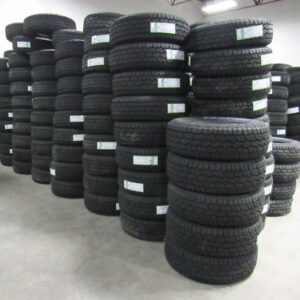Summer Tires VS All Season Tires?
There are many questions surrounding this subject such as, Is all season tires better than summer tires? Can I use summer tires all year? Can I drive summer tires in the winter? Is it worth changing to summer tires? And many more. We here at Nothing But Tires have created a resource showing you the pros and cons of both options and providing an in depth analysis for you to decide what works best for you and your vehicle as well as budget.
The choice between summer and all-season tyres comes down to the specific requirements of the vehicle you drive and the weather in your area.
Summer tires, which are also sometimes referred to as performance tires, have been developed specifically to function well when the temperature is high. They offer superior grip, steering, and braking performance on dry as well as wet pavement throughout the warm summer months. Summer tyres often have a softer rubber compound, which provides exceptional traction and responsiveness when the temperature is warm. However, these tyres may not perform as well in colder temperatures or on surfaces that are icy or covered in snow.
On the other hand, all-season tyres are made to perform well on a variety of surfaces and in a variety of weather conditions, such as on roads that are dry, roads that are wet, and roads that have a little coating of snow. In comparison to summer tires, they are constructed using a more durable rubber compound and have a tread life that is significantly longer. Because they may provide good performance throughout the year without the need for replacement, all-season tyres are a smart choice for regions that have climates that are between hot and cold extremes or that see frequent weather shifts.
Last but not least, the decision between summer tyres and all-season tyres is one that should be made based on the climate and road conditions where you live, in addition to the preferences you have for how you drive. If you live in a location where the summers are hot and the winters are mild, summer tyres could be a good option for you if you want the maximum performance possible throughout the warm months. If you drive throughout the year in a range of weather conditions, or if you would like the convenience of not having to change your tyres occasionally, all-season tyres may be a better solution for you. When choosing between summer tyres and all-season tires, it is important to take into consideration factors such as the temperature, the conditions of the road, and your typical driving habits.

Interest in finding out more about the differences that exist between all-season tyres and summer tyres?
Let’s take a more in-depth look at the distinctions that may be made between summer and all-season tyres.
1. Performance in Warm Weather: Summer tyres have a tread pattern and rubber compound that provide exceptional grip and responsiveness on both dry and wet roads. This allows them to perform very well in conditions where the temperature is high and the sun is shining. The softer rubber compound used in summer tyres is engineered to maintain its malleability in higher temperatures, which results in improved grip, handling, and braking performance throughout the warm summer months. It is possible that all-season tyres will not work as well as summer tyres in situations of extreme heat or high-performance driving since they are designed to function well in a wider range of weather conditions. On the other hand, summer tyres are specifically designed to operate sufficiently in a narrower range of weather conditions.
2. Wet-Road Performance: Summer tyres have wider grooves and channels in their tread pattern, which are designed to effectively evacuate water and reduce the risk of hydroplaning on wet roads. Winter tyres have narrower grooves and channels in their tread pattern. When the conditions are damp, this helps with traction and control. Even while all-season tyres handle well in wet situations, the tread patterns on these tyres may not be as well designed for maximum wet grip as those on summer tyres. It’s possible that summer tyres offer better grip and handling in conditions where there’s a lot of standing water or heavy rain.
3. The ability to perform in icy conditions and snow is where summer tyres and all-season tyres diverge significantly from one another. Because their softer rubber composition becomes more rigid at lower temperatures, summer tyres are not designed to be used when the weather is wintry or cold. This causes the tyres to have less traction and reduces their overall performance. On the other hand, summer tyres do not have the aggressive tread patterns or biting edges that are necessary for traction on roads that are covered in snow or ice. All-season tires, on the other hand, are constructed with a tougher rubber compound that is able to remain bendable in lower conditions. Additionally, many all-season tyres include tread patterns that include sipes or other elements that can provide some traction on light snow or slush. They are not, however, appropriate for really harsh winter circumstances; therefore, in regions that receive a substantial amount of snowfall or have roads that are covered in ice, dedicated winter tyres are suggested for the highest possible level of safety.
4. Tread Life: Summer tyres are made with a softer rubber compound, which results in excellent performance but wears out more quickly than all-season tyres. Because of the more durable rubber compound, all-season tyres have a longer tread life and may continue to perform well across a number of different seasons. This makes them more cost-effective in the long run.
5. Ease of Use: All-season tyres are more convenient than seasonal tyres because they do not require replacement throughout the winter or summer months. Summer tires, on the other hand, may require upgrading to a new set of tyres for winter driving, which may involve additional expenditures and labour. This is because summer tyres are not designed to withstand the harsh conditions of winter driving.
6. Your Driving Style and Preferences: The tyres you choose to use may also be affected by the way you drive and the preferences you have. If you place a high priority on performance, handling, and grip during the warmer months of the year and are willing to switch to winter tyres when the weather turns colder, summer tyres can be the ideal choice for your vehicle. All-season tyres are a good option to take into consideration if you place a high emphasis on convenience, versatility, and fair performance throughout the year.
To summarize, summer tyres are designed to provide optimal performance in warm weather by having a high level of grip and responsiveness; nevertheless, they may not provide optimal performance in cold or snowy conditions. It is possible that all-season tyres will not perform as well as summer tyres in conditions of extreme heat or high-performance driving, despite the fact that they work admirably in a wide range of weather conditions, including light snow. When determining whether to purchase summer tyres or all-season tyres for your vehicle, you should take into account the climate, your driving habits, your available budget, and your own personal preferences.
Which features to look for in summer and all-season tyres
When deciding between summer tyres and all-season tyres, there are various crucial factors to take into consideration, including the following:
Tires for Summer:
1. Tread design: When shopping for summer tires, look for models that have a tread design that is optimised for hot weather. These models typically have deeper grooves that are designed to effectively evacuate water and improve traction on dry terrain.
2. Tread Compound: Summer tyres often have a tread compound that is made of a softer rubber than winter tires, which provides better traction in warm weather. Find tyres that have a high-quality tread compound if you want the most out of their performance.
3. Performance Ratings Examine the tyre’s performance ratings, such as traction, handling, and braking, as rated by companies such as Tire Rack, to ensure that they meet the requirements for the desired level of performance that you have established.
4. Dimensions Choose tyres that are compatible with the minimum and maximum load capacities of your vehicle in order to achieve the best possible fitment and performance from your tyres.
5. Noise and Comfort: Consider the tyre’s degree of noise as well as the ride comfort when making your purchase. Some summer tyres are designed for sportier handling, but they may produce more noise on the road or have a rougher ride.

Tires Suitable for Every Season:
1. Look for all-season tyres with a variable tread pattern that may provide appropriate traction on dry, rainy, and light snow roads. This is an important consideration when purchasing all-season tyres. When driving in wet or snowy conditions, tread patterns that include sipes, which are microscopic slits, can help improve traction.
2. Tread Compound: In general, all-season tyres feature a more durable rubber compound than summer tires, which results in a longer tread life. Look for a tread compound that has a long lifespan and strikes a balance between performance and durability.
3. Performance Ratings: Inspect the tyre’s performance ratings, such as those for traction, handling, and braking, to confirm that they meet the criteria you have established for driving conditions that occur throughout the year.
4. Dimensions Choose tyres that are compatible with the minimum and maximum load capacities of your vehicle in order to achieve the best possible fitment and performance from your tyres.
5. Seasonal Performance Take into account the weather conditions in your region, such as severe snowfall or excessive heat, and choose all-season tyres that are adequate for the situations that you may find yourself in.
When choosing between summer tyres and all-season tires, it is important to consider both your budget and the driving conditions that you encounter the most frequently. Summer tyres may deliver superior performance during the warm months, but they may also wear out more quickly and struggle to operate adequately when the temperature drops or the roads become slippery. It is possible that all-season tyres will not perform as well as more specific summer tyres when the temperature is high or while you are engaging in high-performance driving. All-season tyres are convenient and versatile for year-round driving.

When it comes to driving in the weather of Alberta, whats better summer tyres or all-season tyres ?
The climate of Alberta, Canada, may be quite unpredictable throughout the course of a year. The province experiences sweltering summers and frigid winters, and the latter season is typically accompanied by snowy and icy road conditions. If you live in an area of Alberta that experiences a mild winter, you may be able to get away with driving on all-season tyres. However, if you live in an area that experiences severe winter weather, it is strongly recommended that you switch to winter tyres.
During the summer months in Alberta, summer tyres can surpass all-season tyres in terms of performance, grip, and handling because summer tyres are designed specifically for hotter temperatures. Summer tyres are designed to perform very well in hot weather, with exceptional traction and responsiveness on dry as well as wet roadways. Summer tyres are typically available in wider sizes. The softer rubber compound and unique tread patterns found on summer tyres allow for greater performance in hot circumstances. This makes summer tyres an excellent choice for the scorching summers of Alberta. In spite of this, investing in all-season or all-weather tyres might be a good idea because they maintain their level of performance throughout the year, regardless of the season. This is especially true during the warmer months of spring and fall.

Tips For Maintaining Tires to Get Great Mileage
You can extend your tires’ life, performance and safety by following a few easy guidelines*.
- Maintain proper tire pressure and inflate according to the recommendations of the car’s maker.
- Rotate and balance your tires at the recommended intervals to avoid irregular tread wear.
- Avoid potholes and uneven terrain.
- To increase tire life, travel at a constant speed over extended distances.
- Refrain from driving at high speeds for a long duration. Otherwise, heat accumulation could lead to the degradation of rubber compounds.
* https://www.nhtsa.gov/equipment/tires

Bottom Line
You have been armed with the knowledge required to take proper care of your vehicle now that you better understand the signs that indicate that your tires might need to be replaced.
Investing in better tires for your automobile is a fantastic method to prevent traffic accidents. It also enhances your steering control, which is vital for your safety.
To prevent overusing and prematurely wearing down your car, it is advised that you replace your tires every six years.
So, pay attention to your tires to have a great experience while maintaining safety while driving.

Address
Our Address and new location to our wide selection of tyres is:
Bay 13, 4216 – 54th Avenue S.E.Calgary, AB T2C 2E3
Our company phone number is -1-403-279-7200
We Value your feedback and review so let us know how we are doing!

CONTACT NOTHING BUT TIRES
Looking For Tire Information?
Let us know if you have any questions related to our consignment Program, our business, or if you just wanted to say hello!
FREE SHIPPING IN ALBERTA !
EDMONTON
780.454.1300
14545 118 Avenue NW
Edmonton, AB T5L 2M7
MON – FRI: 10AM – 6PM
SAT: 9AM – 5PM
CLOSED SUN
CALGARY CALL US!
403.279.7200
CALGARY ADDRESS
Bay 13-14, 4216 – 54th Avenue S.E.
Calgary, AB T2C 2E3
CALGARY HOURS
MON – FRI: 10AM – 6PM
SAT: 9AM – 5PM
CLOSED SUN
FREE SHIPPING IN ALBERTA !
EDMONTON
780.454.1300
14545 118 Avenue NW
Edmonton, AB T5L 2M7
MON – FRI: 10AM – 6PM
SAT: 9AM – 5PM
CLOSED SUN
